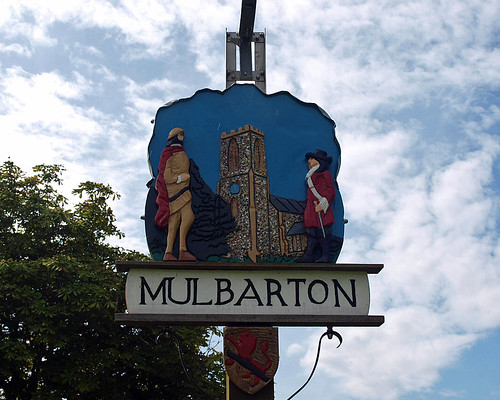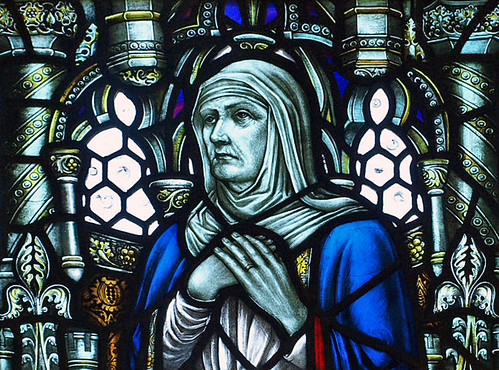One treasure that threw me was Sarah Scargill's extraordinary monument which was closed and which I failed to realise what it was. A contact on Flickr [jmc4 - Church Explorer] captured it open here.
ST MARY MAGDALEN. Dec W tower and nave, Perp chancel, N aisle of 1875. - FONT. Octagonal, simple, with quatrefoils. - SCULPTURE. Small fragment of an alabaster altar. - STAINED GLASS. Figures etc. of the C15 in the chancel E and one S window. - PLATE. Norwich-made Chalice and Paten of 1567-8 and Paten of c.1661. - MONUMENTS. Sir Edwin Rich d. 1675 (nave W). Big tablet flanked by coarse foliage scrolls and with an oversized hour-glass at the top. - Mrs Sarah Cargill d. 1680 (chancel SW). A very curious conceit. The wooden back of a Bible as a pedestal carries a copper diptych which, when one approaches it, is closed. It can be opened by a handle and contains a long inscription by Mrs Cargill’s husband. It reads as follows:
Dear Love, one Feather’d minute and I come
To lye down in they darke Retireing Roome
And mingle Dust with thine, that wee may have,
As when alive one Bed, so dead one Grave;
And may my Soul teare through the vaulted Sky
To be with thine to all Eternitie.
O how our Bloudless Formes will that Day greet
With Love Divine when we again shall meet
Devest of all Contagion of the Flesh
Full filled with everlasting joys and Fresh
In Heaven above (and ’t may be) cast an eye
How far Elizium doth beneath us lye.
Deare, I disbody and away
More Swift than Wind
Or Flying Hind
I come I come away.
- George Gay d. 1729 (chancel N). Tablet with weeping putti at the top.
MULBARTON. It has one of the biggest greens in Norfolk, and most of its scattered houses and cottages look on to the common land, of which there is nearly 50 acres. A high tower with chequered buttresses dominates it all from one corner, crowning a much-restored little church.
What is old in the church comes largely from the 14th century. Old glass in the east window shows Adam and Eve in the garden, a man in blue digging under a red sky, a knight in armour with a chained demon, a bishop, and a crowned figure in white and gold with a sword; and other old glass in the nave shows musical angels with harp and guitar, an old man in white and gold with a boy reading beside him, and a crowned man with a sceptre, carrying a cathedral. A curious brass memorial in the form of a book with a hinged cover, standing on a closed Bible, has an inscription to Mrs Sarah Scargill, “cozin to Sir William le Neve, Herauld to King Charles the First of blessed memory.”
A boy who grew up to be famous listened here to his father’s sermons, and here, at 13, he stood to see his mother laid to rest. He was Sir Thomas Richardson, Speaker in 1621 and Lord Chief Justice in 1631; and it is he who led men’s thoughts away from old barbarous customs to fairer methods of justice when he declared it illegal to use the rack for extracting a confession from Buckingham’s murderer.
What is old in the church comes largely from the 14th century. Old glass in the east window shows Adam and Eve in the garden, a man in blue digging under a red sky, a knight in armour with a chained demon, a bishop, and a crowned figure in white and gold with a sword; and other old glass in the nave shows musical angels with harp and guitar, an old man in white and gold with a boy reading beside him, and a crowned man with a sceptre, carrying a cathedral. A curious brass memorial in the form of a book with a hinged cover, standing on a closed Bible, has an inscription to Mrs Sarah Scargill, “cozin to Sir William le Neve, Herauld to King Charles the First of blessed memory.”
A boy who grew up to be famous listened here to his father’s sermons, and here, at 13, he stood to see his mother laid to rest. He was Sir Thomas Richardson, Speaker in 1621 and Lord Chief Justice in 1631; and it is he who led men’s thoughts away from old barbarous customs to fairer methods of justice when he declared it illegal to use the rack for extracting a confession from Buckingham’s murderer.



No comments:
Post a Comment